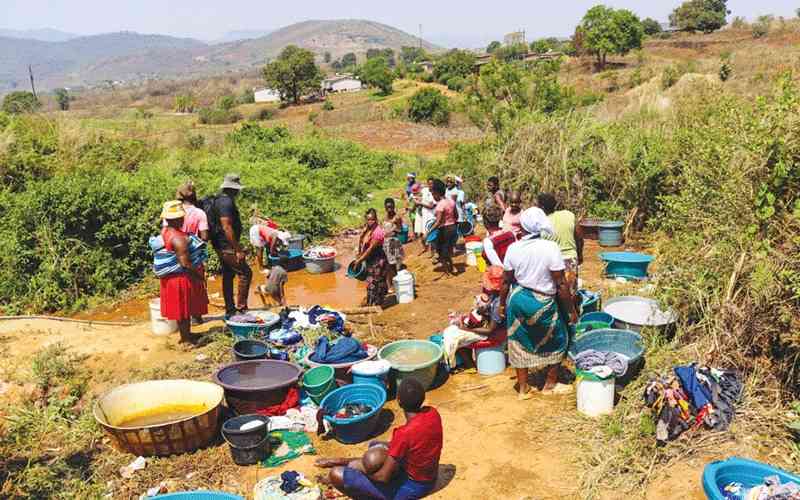
THE chilly wind whips across the barren wheat fields, as Fatima, a small-scale farmer in ward 5, Mutoko district, gazes worriedly at her shrivelled crop.
The once-vibrant plants are dying, victims of the mining industry’s insatiable thirst for water.
For years, she and her family have tended to this land, even during winter ploughing, their sole source of sustenance.
But now, the once-bountiful fields are dying, victim to the insatiable thirst of nearby mining operations.
“The water levels in our wells have been dropping steadily,” Fatima laments, her voice tinged with frustration and fear.
“We used to have enough to irrigate our crops, but now, there’s barely enough for our families to drink,” she said.
Fatima’s story is just one of many unfolding across the districts, as mining companies’ relentless pursuit for valuable resources like gold, lithium and black granite has led to a devastating depletion of the area’s water resources.
The consequences have been far-reaching, impacting not only local farmers and their livelihoods, but also the delicate balance of the ecosystem, threatening wildlife and biodiversity.
- Teachers, other civil servants face off
- Veld fire management strategies for 2022
- Magistrate in court for abuse of power
- Vungu Dam water treatment and irrigation project takes off
Keep Reading
Government officials, development experts and environmentalists alike have sounded the alarm, warning of the dire social and environmental costs of this unchecked water extraction.
Yet, the thirst of the mining industry appears unquenchable, leaving communities like Fatima’s to grapple with the harsh realities of water scarcity, security and the spectre of displacement.
According to government data, the mining sector’s water consumption across the districts in the region has skyrocketed by over 50% in the past decade, with companies extracting millions of litres of groundwater each day to support their operations.
“The scale of this water usage is simply unsustainable,” laments international environmental expert Amina Khalil at the University of Monsul, quoted in a recent presentation Environmental Toll of Mining’s Relentless Demand for Water, providing a comprehensive look at the dire ecological consequences of the excessive groundwater extraction.
“It is not just the farmers who are suffering; the entire ecosystem is under threat,” she further said in the presentation.
The impact on the agricultural value chain has also been devastating.
“We have seen a dramatic drop in crop yields, which has a ripple effect on the entire community,” explained Kenyan development economist and expert in rural development, John Mwangi in an interesting paper published recently titled Dwindling Waters, Withering Harvests: The Socio-economic Impacts of Mining-Induced Water Scarcity on Rural Farming Communities.
“We have seen farmers struggling to make ends meet, and food prices rise, making it increasingly difficult for families to access the nutrition they need,” he noted in his paper.
Further, in Zimbabwe, the displacement of local populations is also a growing concern.
“We have already seen some communities being forced to relocate due to the depletion of their water sources,” said a Zimbabwean government official in the Lands ministry, speaking on condition of anonymity.
“The social and economic disruption caused by mining companies is immense and given the growth of mining operations country-wide, it is only going to get worse if this issue isn’t addressed accordingly,” he asserted.
“The scale of this water usage is simply unsustainable,” laments Zimbabwean environmental expert Thembi Moyo from the University of Zimbabwe.
“It is not just the farmers who are suffering; the entire ecosystem is under threat,” she added.
Moyo’s research has documented the devastating impacts of the mining industry’s excessive groundwater extraction on the fragile ecosystems in Zimbabwe.
“We are seeing dramatic declines in wildlife populations, the drying up of wetlands and loss of critical habitats. The long-term consequences for biodiversity can be catastrophic if this issue is not addressed,” she noted.
Development economist, Tendai Chirume, who specialises in rural livelihoods at the Zimbabwe Environmental Law Association, explained the ripple effects on the agricultural value chain.
“We have seen a dramatic drop in crop yields, which has had a devastating impact on smallholder farmers and the communities that rely on them,” he said.
“Food prices have soared, making it increasingly difficult for families to access the nutrition they need.”
Chirume warns that the economic disruption is leading to increased poverty and out-migration from rural areas.
“The unravelling of the agricultural sector is threatening traditional ways of life and social cohesion in these tight-knit farming communities. We are facing a real humanitarian crisis if this water crisis is not addressed urgently,” he asserted.
Esther Muzondiwa, director for the Zimbabwe Smallholder Farmers’ Union, amplified the voices of local farmers like Fatima.
“Our people are suffering and the future of our land and livelihoods is at stake. We will not give up without a fight, but we need the support of the government and the mining companies to find sustainable solutions,” she said.
Experts provide crucial local insights and perspectives, underscoring the dire social, economic and environmental consequences of the mining industry’s insatiable thirst for water.
Their calls for action and emphasis on the need for collaborative, community-based solutions are crucial in driving meaningful change.
In Kenya, the environmental consequences of water extraction are equally dire.
“The mining operations are devastating local wildlife habitats and decimating biodiversity,” Kenyan wildlife biologist Kioni Mburu warned.
In a presentation at the 2022 East African Biodiversity Conference, Mburu warned that mining operations are “devastating local wildlife habitats and decimating biodiversity”.
He cited a dramatic decline in endangered species, cautioning that the long-term impacts on the ecosystem can be “catastrophic” if left unchecked.
Experts and community leaders alike are calling for a comprehensive, multi-stakeholder approach in addressing the crisis.
“We need to find a holistic way to balance the needs of the mining industry with the rights and well-being of local communities,” urged Hardlife Mudzingwa, executive director for the Community Water Alliance, a pressure group on water security around mining operations, during a recent training for local journalists.










